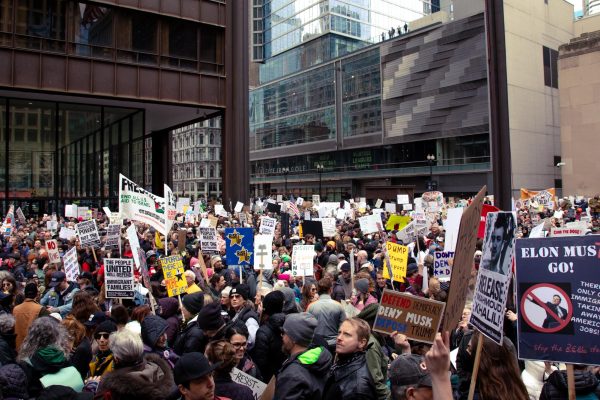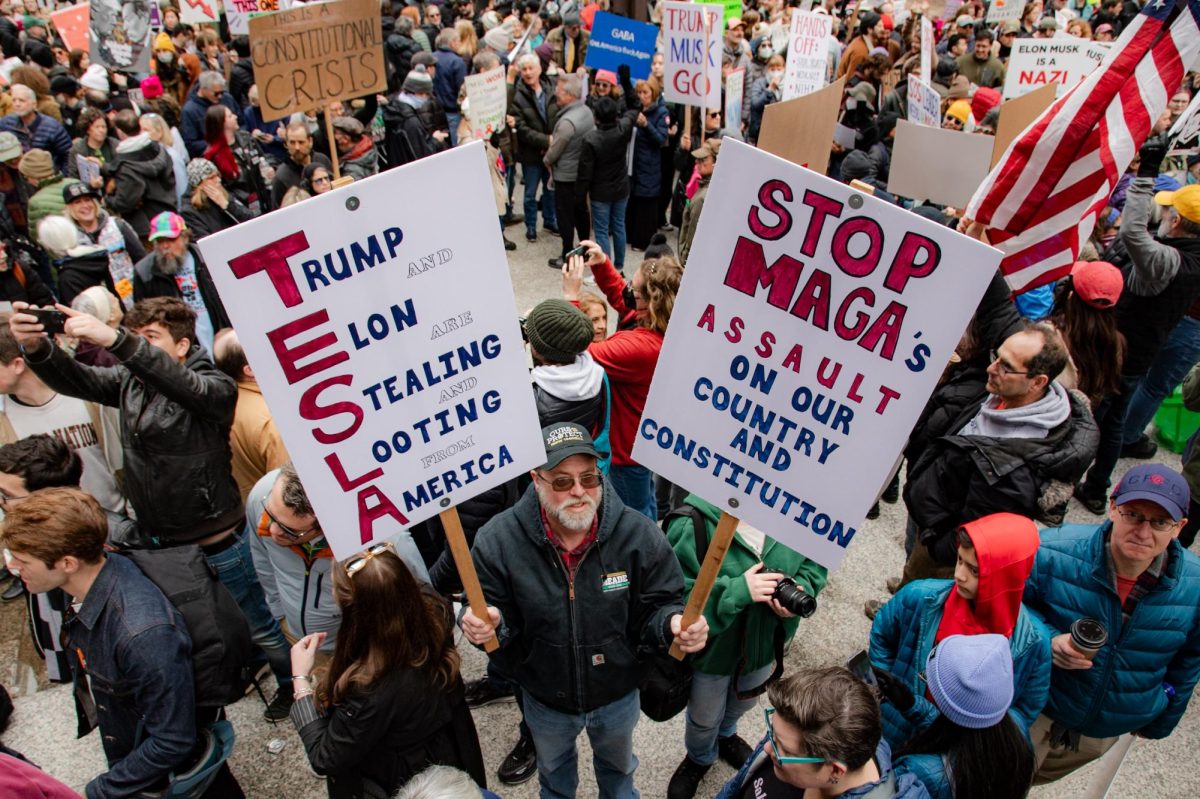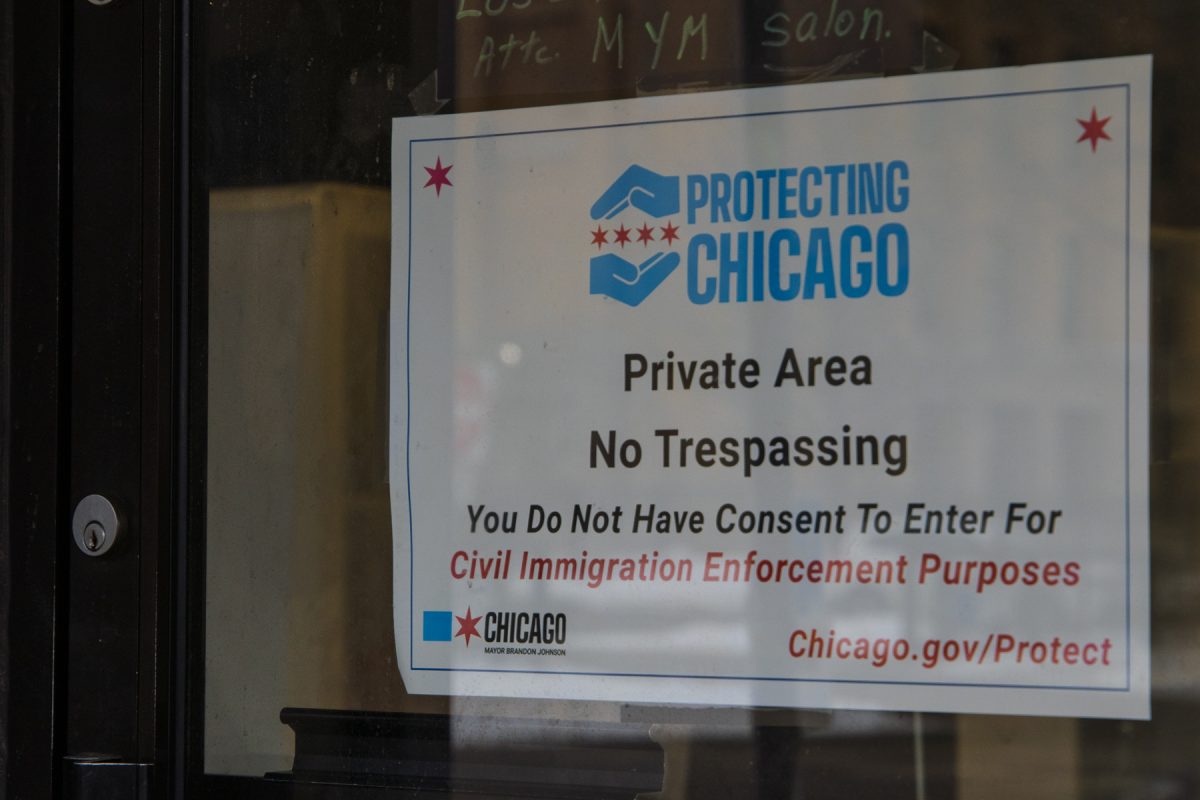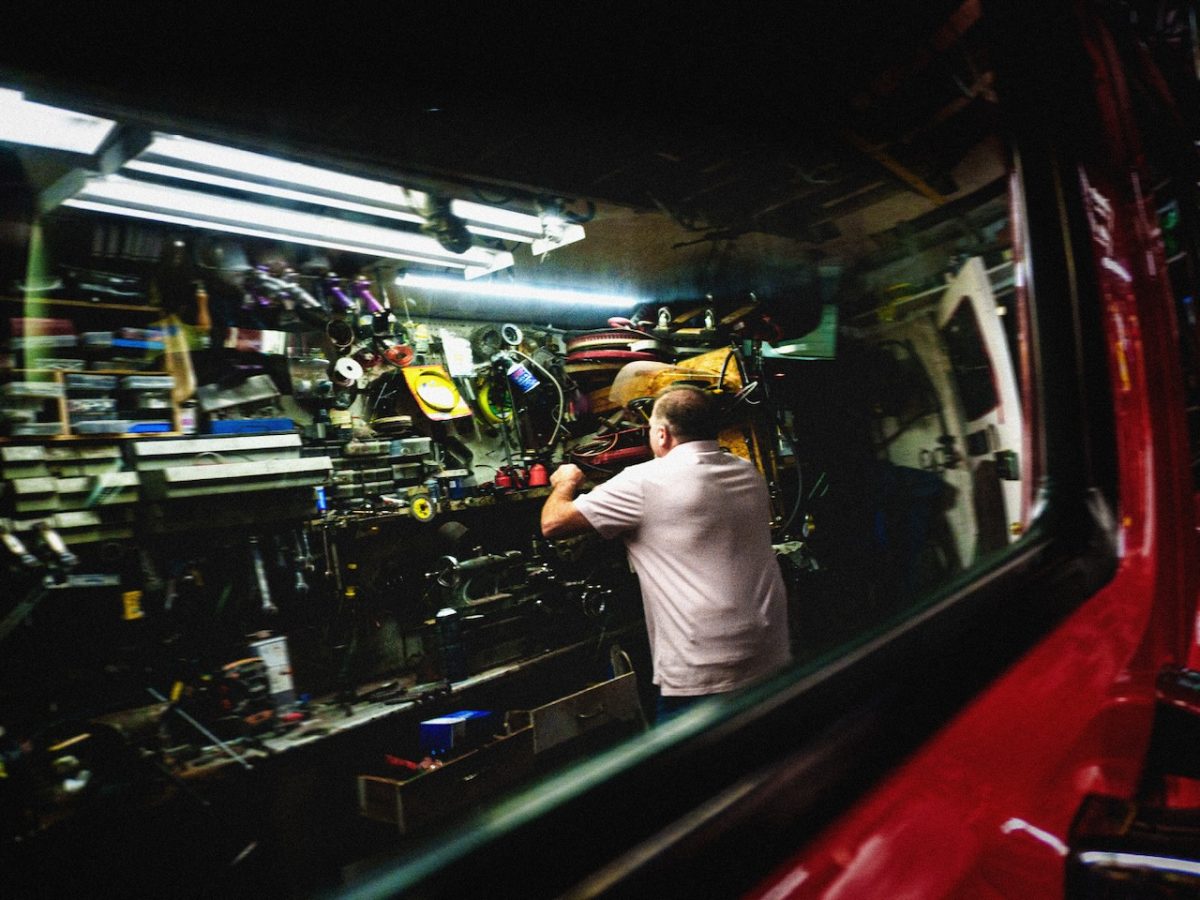Chants of “Hands Off” echoed through downtown Chicago on Saturday, April 5 as thousands of protesters gathered in solidarity with demonstrations across the nation. The rally at the Richard J. Daley Center in downtown Chicago was organized by a diverse coalition of local groups opposed to what they describe as the catastrophic impacts of the Trump Administration and its allies, including billionaire Elon Musk, Trump’s senior advisor.
The demonstration was part of a coordinated national Day of Action occurring in multiple cities. More than 1,200 “Hands Off!” demonstrations were planned by more than 150 groups across the country, including on the National Mall in Washington, D.C.
The Chicago event was organized by the Chicago Federation of Labor, Equality Illinois, the Illinois Coalition for Immigrant and Refugee Rights and Indivisible Chicago.
“We did not vote for this,” said Patricia Graham, board member of the Indivisible Chicago Alliance, a nonprofit that promotes progressive values and grassroots engagement. “We did not ask for democracy to be taken down, nor did we ask for people’s rights to be taken away. So when we band together, we show that power to the regime and to ourselves, because volunteering and protesting is contagious.”
The rally addressed concerns spanning labor rights, LGBTQ+ equality, immigrant rights, reproductive freedom and environmental issues. Protestors filled the plaza carrying handmade signs with messages like “Hands Off Our Rights” and “Protect Social Security.” The crowd ranged from college students to retirees, creating a sea of movement despite the possibility of rain.
For many attendees, the issues were deeply personal. Megan Ramelli from Chicago’s West Loop, who has become more politically active since last November, expressed concerns about healthcare research funding as she is a part of a National Institute of Health clinical study.
“We’re really worried that funding will get cut and my study will get canceled. So that’s kind of been my main motivator to keep up with everything and get up and fight back,” Ramelli said.
Social Security and Medicare were prominent concerns among protesters. A trio of friends from Chicago’s South Side, Rain Wolf, Cheryl Freeman and Cindy Allison, held handmade signs expressing their fears about the future of social safety nets.
“My Social Security is being attacked. My Medicare and Medicaid are being attacked. Even my history at the National Museum of African American History and Culture is being attacked,” Allison said. “I was motivated in 2016, but I’m even more motivated now.”
Musk’s Department of Government Efficiency has slashed programs and federal agencies. In February, the SSA announced that it would cut 7,000 people from its 57,000 workforce and eliminate six regional offices.
Additionally, Trump also issued an executive order aimed at the Smithsonian Institution that seeks to address what he considers the promotion of “improper ideology” in its exhibits and educational programs, particularly those related to race, history and cultural narratives.

Marching down LaSalle Street, Beth Tomas of Wheaton held a bright pink sign that read “Willful ignorance will not save you.” She said she was here to speak against multiple issues.
“There’s just so many reasons, economics, women’s rights, trans rights, immigrant rights, just our rights period. You know, they’re slowly taking them away from us one by one, and they need to be restored,” Tomas said.
Immigrant rights were also a prominent concern, reflected in various signs throughout the demonstration. Grace Winters, a paralegal at Cabrini Green Legal Aid who works closely with undocumented immigrants, voiced her concerns about their mistreatment.
“I’ve always thought that even if you’re obviously undocumented, you still have due process, even if you’re in civil violation, you shouldn’t be treated like a criminal, and it’s been pretty devastating seeing the amount of families being torn up over the past couple months,” Winters said.
Winters‘ concerns reflect recent debates over the Trump administration’s approach to immigration, particularly the rapid deportations and the legal and humanitarian implications of such policies.
Finn Ivanov-Gonzalez, who traveled from DeMotte, Indiana, noted that the level of support at this rally was unmatched compared to previous protests they had attended.
“What motivated me was I am a non-binary person who is biologically female, and everything that’s going on is not only affecting one side of who I am, but affecting the side that’s who I was born as, and that’s not fair at all that I’m getting… it feels like I’m being targeted from every angle of my life,” Ivanov-Gonzalez said.
Police maintained a visible presence around the perimeter of the rally, with officers following by the sidelines. The demonstration remained peaceful throughout.
D.L. Haven from Chicago’s South Side attended to protest against the erasure of Black history.
“The message that it should send is that it doesn’t matter whether someone gains office through the vote or not if they stop serving the American people. The people have a right to have their grievances addressed just as it says in the Constitution,” Haven said.
Some protesters drew parallels to historical movements. Noel Ingalls Adams, who traveled from Madison, Wisconsin, said the protest was reminiscent of demonstrations he participated in during the 1960s against the Vietnam War.
“I was in the demonstration there and it got violent, but it stopped the Vietnam War. It’ll make a change and I want people to see us on TV and think ‘there’s more people like me, I better get my butt out there,'” Adams said.
Joan McGrath, an administrative assistant at the School of Film and Television, planned to retire this year but said she now faces uncertainty.
“I don’t think the [Trump administration] listens to people but I think that they need to know that there’s a lot more of us than there are of them,” she said, “and they are going to have to come through us to destroy this country.”
Copy edited by Trinity Balboa
Resumen en Español:
Los gritos de “Manos fuera” resonaron en el centro de Chicago en una de las manifestaciones que surgieron en todo el país el 5 de abril. La protesta, en el Centro Richard J. Daley en 50 W. Washington St., fue organizada por una coalición diversa de grupos locales que se oponen a lo que describen como impactos catastróficos de la Administración Trump y sus aliados, incluido Elon Musk.
El evento formó parte de un Día de Acción Nacional coordinado que se llevó a cabo en varias ciudades, marcando una de las primeras muestras de oposición importantes a nivel nacional desde la toma de posesión de Trump en enero.
El evento, organizado por la Federación Laboral de Chicago, Illinois para la Igualdad, la Coalición de Illinois por los Derechos de los Inmigrantes y Refugiados, e Indivisible Chicago, reunió a activistas de diversas causas en un esfuerzo unificado y no violento.
Algunos manifestantes conectaron el momento a movimientos históricos. Noel Ingalls Adams, quien viajó desde Madison, Wisconsin, dijo que la protesta le recordaba a las manifestaciones en las que él participó durante la década de 1960 contra la guerra de Vietnam.
“Estuve en la manifestación y se puso violenta, pero detuvo la guerra de Vietnam. Esto marcará la diferencia y quiero que la gente nos vea en televisión y piense: ‘Hay más gente como yo, mejor me muevo'”, dijo Adams.
Resumen por Araceli Ramirez
Resumen editado por Manuel Nocera





